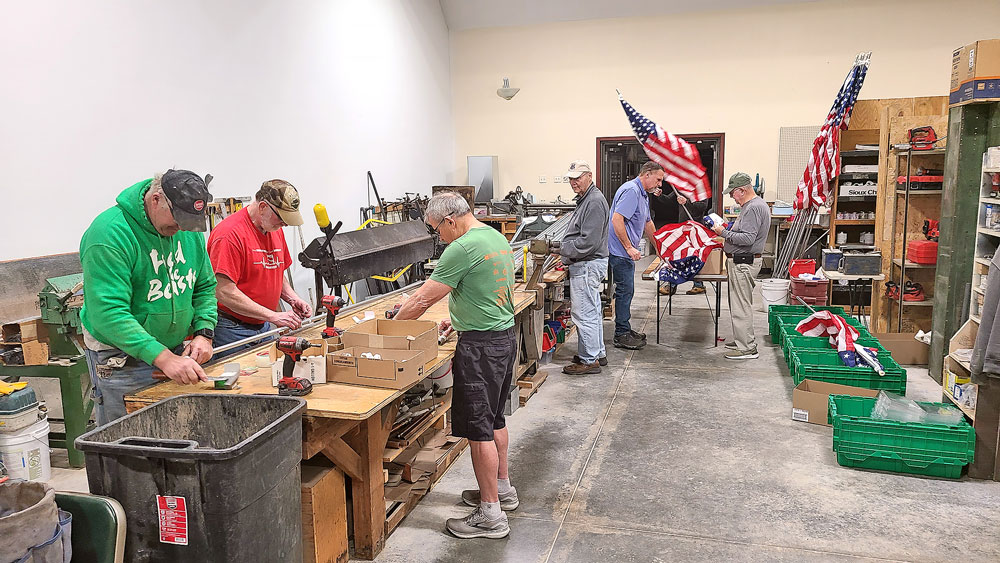Development group looks at property purchase

By Bob Steenson, bsteenson@charlescitypress.com
The goal of Charles City and the local economic development corporation to create a state-certified industrial development site has been advancing in recent weeks, with the selection of a site location and making an offer to buy the property.
Information about the process became public Thursday morning at a meeting of the Southwest Bypass TIF Administration Board. That’s a joint city-county board that guides the tax increment financing district that includes the Southwest Development Park (where MITAS and other businesses are located).
The site selected is almost 76 acres on the northeast corner of the intersection of South Grand Avenue and U.S. Highway 218. It is owned by Steven and Diana Swartzrock and Rockland Enterprises LLC.
That property is not now in the Southwest Bypass TIF District, but the administration board is considering a proposal to add the property to that TIF district so money from that district can support the purchase.
No action was taken Thursday morning, and both the City Council and the Board of Supervisors would have to vote to amend the TIF district agreement to make the purchase possible.
A number of issues are involved, and the meeting Thursday morning lasted almost 2½ hours, with the site project discussion taking up much of that time.
The Charles City Area Development Corp. has signed a memorandum of option agreement that was recorded at the Floyd County Recorder’s Office. It gives notice that the development corporation has a two-year option to purchase the Swartzrock property.
The purchase price, disclosed at the meeting Thursday, would be $2.156 million, or almost $28,500 an acre.
The Swartzrocks would use the proceeds of the sale for a like-kind tax-deferred property purchase of 153.7 acres of farmland from Leland and Kristeen Boyd.
Floyd County Supervisor Mark Kuhn, who represents the supervisors on the TIF board, said he was concerned about the public reaction to the purchase of the farmland, which will cost the Swartzrocks more than $14,000 an acre.
The public — especially farmers — will look at that and say the area development corporation is paying more than $14,000 an acre for farmland, Kuhn said, after reading off a list of previous area farmland sales that ranged in the $8,000s to $9000s per acre.
But Connie Parson, of Parson Real Estate, said there’s no correlation between the price of commercial property and ag property.
Parson has been working with the development corporation to locate property for a certified site, and represented the development corporation in helping negotiate an option to purchase.
“We do not have an option on that farm,” she said. “We have an option on the 75 acres.”
But Kuhn said whoever sells bonds to finance the purchase, the city or the county, will have to explain to the public the farmland purchase as part of the package.
“It is going to be a part of that discussion,” Kuhn said. “Every farmer is going to want to know what the Boyds traded that property for.”
City Attorney Brad Sloter said, “What ADC is proposing is purchasing that 75 acres of commercial property. From there what the owner does with the proceeds is up to the owner. If he wants to purchase farmland he can. If he wants to purchase commercial property he can.
“He chose to put an option on farm ground in order to facilitate a like-kind exchange so he wouldn’t occur tax consequences from the sale of the property,” Sloter said.
City Councilman Jerry Joerger, who is a member of the TIF board, said, “If he wants to pay $14,000 an acre for farm ground, that’s up to him.”
City Councilman DeLaine Freeseman, also on the TIF board, said the question should be is the development corporation paying a reasonable price for the property it is buying, not what the seller does with the money.
“We can’t control” what the property owner does with the proceeds of the sale, he said.
Parson said she thought the development corporation did a good job negotiating the price for the Swartzrock property, because of its location and the infrastructure already available in the area.
“I believe this is extremely fair” for commercial property, she said. “We believe by far and away it is the best site we could have for an industrial park.”
Kuhn said, “I’ve tried to convey my concerns as it will be viewed by a member of the community. Every property owner, every farmer in this county will see this exchange and they will see it from a slightly different viewpoint than the Charles City Area Economic Development Corporation. So that’s fine.”
The Charles City Area Development Corp. has been making a concerted effort to find property for a state-certified site since last fall.
Tim Fox, executive director of the development corporation, said a state-certified site tells businesses looking for a place to locate that this property won’t have any problems.
He told the Press last winter that such a site will have a clear title. Geotechnical, civil engineering, threatened and endangered species, historical and archaeological studies will have been completed. It will have been surveyed and will be zoned properly. It will be near suitable road infrastructure and meet utility minimum requirements.
Parson said this site meets or will be able to meet all the requirements for state certification.
Fox said he has already applied to start the state certification process because he has the option to buy. The certification can’t be completed, however, unless the property is owned or there is at least a three-year option.
“They prefer five years,” he said.
Fox said Thursday morning that there are 19 certified sites in Iowa currently.
“It’s a profound marketing tool to know that you have a certified site,” he said. “It gives us some exposure with site selectors. It gives us a page on the Iowa Economic Development Authority website where they can see all 19 at the same place.”
He said other sites that were identified in the search were either more expensive or would have required hundreds of thousands or even millions of dollars of infrastructure improvements.
“Here we have four-lane highway, electricity on two sides, a natural gas line to the north, telecommunications to the north. We have water and sewer under the street on Southgate Drive. It’s a pretty complete package,” Fox said.
The members of the TIF board also talked about financing the purchase.
The property is currently in the South Grand TIF District, said Charles City Administrator Steve Diers. But that district does not have enough development in it to support the cost to purchase the Swartzrock property.
The proposal is to make the Swartzrock property part of the Southwest Bypass TIF District, which has much more available funds because of the industrial development that has taken place there.
Either the city or the county would sell bonds to finance the purchase of the property, then be repaid through TIF funds.
Bonding attorney John Danos, of the law firm Dorsey and Whitney, attended the meeting Thursday by phone.
He said the bonds could be sold as general obligation bonds, backed by the taxing authority of the city or the county, through a reverse referendum process.
The bond seller would have to hold a public hearing, and advertise that the public could collect signatures to demand a referendum on the bond sale.
If no petition was submitted, the city or county could hold the public hearing then issue the bonds.
If a valid petition came in, the city or county would have to decide whether to hold the referendum or look at an alternate form of bonding.
If the bonds are backed by revenue from the TIF district, a public hearing must still be held, but there isn’t an opportunity for a petition for a referendum, Danos said.
The problem with backing the bonds with the TIF district is TIF revenue is considered less secure than general obligation bonds, so it might require a higher interest rate or other requirements.
Tax increment financing — TIF — is a development tool that uses part of the additional property taxes that arise from development to pay for infrastructure, other improvements or business incentives in the district.
The county, city and school district have to forego receiving that additional property tax revenue temporarily while the TIF agreement is in effect, but eventually will start receiving much more property tax revenue than if the development hadn’t taken place.
There was also some discussion on whether the city or county would issue bonds to buy the property.
Diers said the city bonding limit — which is based on the valuation of property in the city — is about $9 million, keeping enough beyond that in reserve for emergencies.
Floyd County Auditor Gloria Carr, who is also a member of the TIF board, said the county’s total bonding capacity — which is based on the total valuation of property in the county — is about $74 million.
About $6.4 million of that is needed for road projects, and about $13.5 million will be needed to finance the new law enforcement center, jail and courthouse updates, but that will still only take up about 26 percent of the county’s bonding capacity, she said.








Social Share